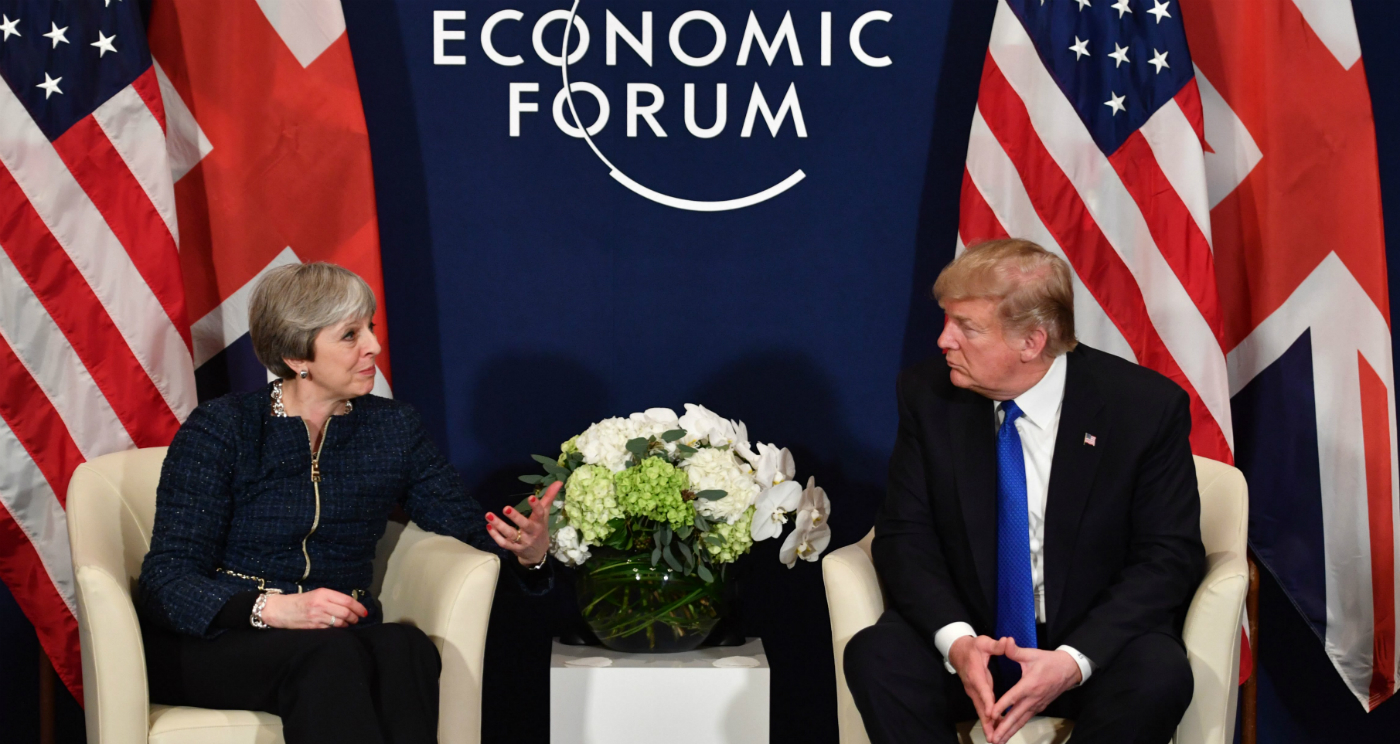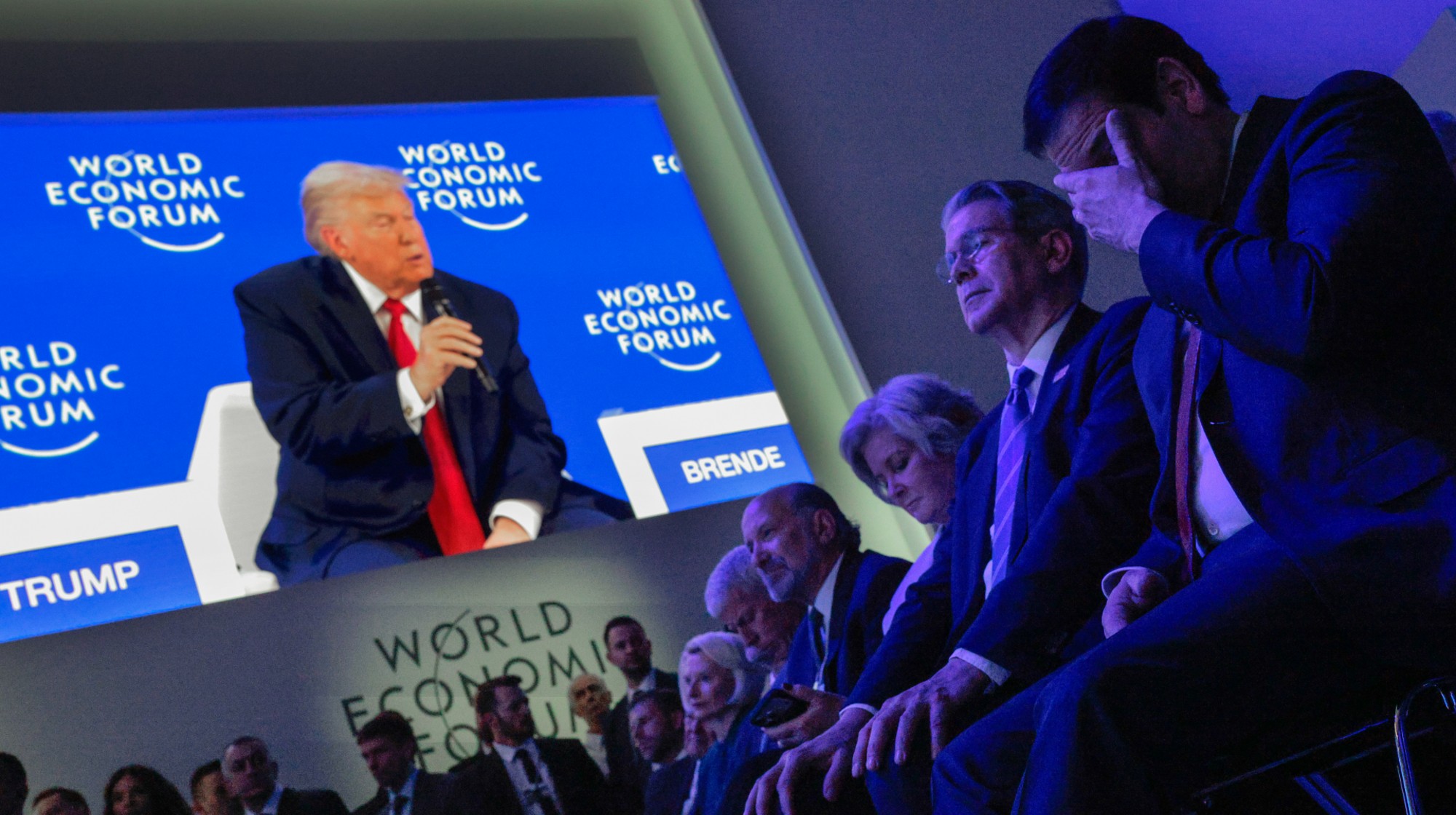Davos 2018: May and Trump repair ‘special relationship’
Two leaders focus on economic development, trade and military issues during meeting

A free daily email with the biggest news stories of the day – and the best features from TheWeek.com
You are now subscribed
Your newsletter sign-up was successful
Theresa May and Donald Trump held talks at the World Economic Forum today, offering the Prime Minister a chance to rekindle the strained “special relationship” following the cancellation of a visit by Trump to London.
Trump went to great lengths to dispel rumours of a rift between the UK and US, saying he and May have a mutual feeling of “liking each other a lot”.
“We have great respect for everything you’re doing, and we love your country. We think it’s truly good,” Trump told the Prime Minister, according to The Guardian.
The Week
Escape your echo chamber. Get the facts behind the news, plus analysis from multiple perspectives.

Sign up for The Week's Free Newsletters
From our morning news briefing to a weekly Good News Newsletter, get the best of The Week delivered directly to your inbox.
From our morning news briefing to a weekly Good News Newsletter, get the best of The Week delivered directly to your inbox.
The UK and the UK are working on economic development, trade and military issues, Trump added.
Some commentators feared that May would struggle to be heard by the US president at all during their meeting in Davos, Switzerland.
“During formal phone calls between the two leaders, May finds it almost impossible to make headway and get her points across,” Bloomberg says. ”Trump totally dominates the discussion, leaving the Prime Minister with five or ten seconds to speak before he interrupts and launches into another monologue.”
White House national security adviser H.R. McMaster said yesterday that Trump was prioritising his hastily arranged meeting with the British leader, “because we do have a special relationship”.
A free daily email with the biggest news stories of the day – and the best features from TheWeek.com
Trump’s two-day Swiss blitz is an opportunity for him to promote his America First agenda to Davos’ globalists, Reuters says. But his mind may be elsewhere, following the revelation that the US president is to testify under oath about claims of Russian meddling in the US election.
Meanwhile, May will be pitching her post-Brexit strategy to billionaires such as Bill Gates, world leaders including Indian Prime Minister Narendra Modi and German Chancellor Angela Merkel, and chief executives from banks and private equity firms such as Blackstone who are considering relocating to Dublin, Frankfurt or the US.
The PM’s speech this afternoon focused on social media giants. She urged investors to pressure tech giants to respond more quickly to extremist content on social networks, the BBC reports.
“Investors can make a big difference here by ensuring trust and safety issues are being properly considered - and I urge them to do so,” May said.
-
 Buddhist monks’ US walk for peace
Buddhist monks’ US walk for peaceUnder the Radar Crowds have turned out on the roads from California to Washington and ‘millions are finding hope in their journey’
-
 American universities are losing ground to their foreign counterparts
American universities are losing ground to their foreign counterpartsThe Explainer While Harvard is still near the top, other colleges have slipped
-
 How to navigate dating apps to find ‘the one’
How to navigate dating apps to find ‘the one’The Week Recommends Put an end to endless swiping and make real romantic connections
-
 Epstein files topple law CEO, roil UK government
Epstein files topple law CEO, roil UK governmentSpeed Read Peter Mandelson, Britain’s former ambassador to the US, is caught up in the scandal
-
 Iran and US prepare to meet after skirmishes
Iran and US prepare to meet after skirmishesSpeed Read The incident comes amid heightened tensions in the Middle East
-
 Which way will Trump go on Iran?
Which way will Trump go on Iran?Today’s Big Question Diplomatic talks set to be held in Turkey on Friday, but failure to reach an agreement could have ‘terrible’ global ramifications
-
 Israel retrieves final hostage’s body from Gaza
Israel retrieves final hostage’s body from GazaSpeed Read The 24-year-old police officer was killed during the initial Hamas attack
-
 China’s Xi targets top general in growing purge
China’s Xi targets top general in growing purgeSpeed Read Zhang Youxia is being investigated over ‘grave violations’ of the law
-
 Ukraine, US and Russia: do rare trilateral talks mean peace is possible?
Ukraine, US and Russia: do rare trilateral talks mean peace is possible?Rush to meet signals potential agreement but scepticism of Russian motives remain
-
 Panama and Canada are negotiating over a crucial copper mine
Panama and Canada are negotiating over a crucial copper mineIn the Spotlight Panama is set to make a final decision on the mine this summer
-
 Trump backs off Greenland threats, declares ‘deal’
Trump backs off Greenland threats, declares ‘deal’Speed Read Trump and NATO have ‘formed the framework for a future deal,’ the president claimed